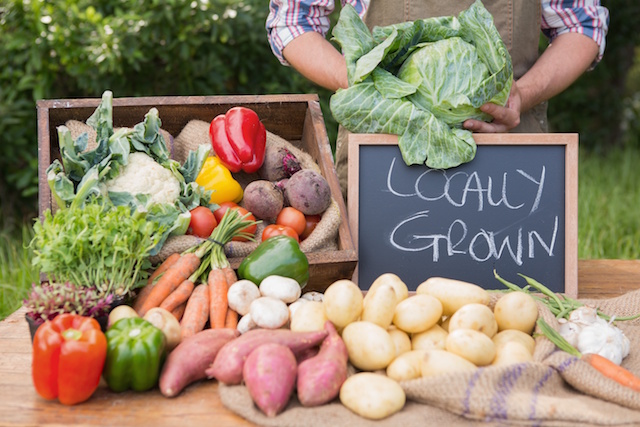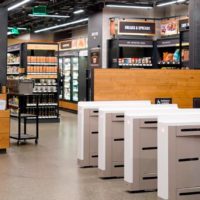
This is a guest post by Scott Marlow, Executive Director of the Rural Advancement Foundation International – USA. Read Food+Tech Connect’s full coverage of the Whole Foods acquisition here.
Amazon’s announcement of its intent to purchase Whole Foods, if it does in fact progress, needs to be seen in the larger context of consolidation across food retail and agriculture.
In 2016, four grocery chains accounted for 36.9 percent of food and beverages sold in the U.S. Walmart, number one, sold 17.3 percent. Whole Foods came in 9th, selling 1.7 percent and Amazon 21st, with 0.8 percent.
This consolidation includes the organic industry. Food and product brands that appear independent are often, in fact, owned by conglomerates. Annie’s Homegrown, Cascadian Farms and Muir Glen are owned by General Mills. Green Mountain coffee by Coca Cola, Seeds of Change by M&M Mars, and Bear Naked and Morningstar Farms by Kellogg, to name a few.
While local and sustainable foods are seen as an alternative to industrial food products, market forces are the same. When an industry becomes consolidated, people may get cheaper products. But in the drive for corporate profits, that market power is often used to transfer costs and risk onto land, people and animals. A dairyman friend looked at the 7-figure salary of a CEO in the consolidated dairy industry and commented, “That’s my milk check.” Long-term studies of the poultry industry tracked the erosion of farmer income and security as the number of companies in the farmer’s region decreased.
Whole Foods’ brand was built on people’s demand for food that’s healthier for themselves, their communities and the planet. The growth of local, sustainable and natural foods has delivered these values in three ways: the inherent qualities of the product, like “free from artificial additives”; the effects of how the product was produced, like “dolphin-safe tuna”; and the economic effects of more equitable distribution of benefits, like “fair trade.”
Customers often seek to replicate the multiple benefits they see in buying directly from farmers at a farmers market, where they can look the farmer in the eye and ask how the food was grown and place their food dollar directly into trusted hands.
This trusted relationship has a great deal of value in the marketplace, even as the connection has gotten more tenuous. The entire sustainable food industry has built much of its business on the value of connections to a farmer. Notice the pictures of producers featured prominently throughout many grocery stores, including Whole Foods. Airport shop fronts labeled “The Farmers Market” sell bottled soft drinks and processed snacks, few of which resemble anything from a farm. The third largest American poultry integrator is called Perdue Farms, despite contracting out all of the actual farming. But does the farmer actually profit in this market?
The relationship-based integrity of the farmers market erodes as the supply chain lengthens. The terms “local,” “natural” and “sustainable,” used widely on a range of products, are essentially meaningless as a market label. None has a definition, standards or any form of certification. With huge capacity for tracking consumers’ purchase patterns, Amazon has the power to market to consumer demand for food delivering environmental, social and economic benefits with few or none of the costs associated with actually providing those benefits.
Grocery consolidation increases the critical importance of label terms that have integrity, like “organic.” Recent examples of organic standards violations in the media show there is at least a standard to be violated, and that there are processes for addressing those violations. Consumers can have more confidence in the term “organic” at Walmart, than “natural” or “sustainable,” even at Whole Foods. While not perfect, the organic label provides the model for consumer confidence in marketplace claims of virtue. Without clear standards and certification, this value is lost.
Whole Foods has been a promoter of the use of organic and other standards, including developing its own. A major concern will be the commitment of an Amazon-owned Whole Foods to the integrity of all of these standards, and the extent to which industry consolidation could erode confidence and clarity for people who want to buy products that reflect their values.
When we boil it down, industry consolidation can provide increased efficiencies, but significant reduction in competition. This includes competition for the products that farmers produce and the value the farmer’s identity provides. When farmers have fewer opportunities to connect to consumers, they have less ability to set prices that reflect their true costs and the value that they add. Consumers must be even more vigilant that their purchases truly provide the benefits they seek.
The brand dissonance driving the attention to the purchase of Whole Foods by Amazon is the difference between the two companies’ reputations for their treatment of local farms and businesses, not the products offered. This potential sale is no different from the consolidation of many other sectors of food and retail. Over time, we will see if investment in the long-term value of providing true benefits to the farmer, the consumer and the planet will outweigh the short-term drive for profit.
So far, that record is not good.
Read Food+Tech Connect’s full coverage of the Whole Foods acquisition here.
______________________________
 Scott Marlow is the Executive Director of the Rural Advancement Foundation International – USA, a non-profit organization based in Pittsboro, NC. Scott previously directed RAFI’s Farm Sustainability program, providing in-depth financial counseling to farmers in crisis, education on disaster assistance programs and access to credit, and addressing the needs of mid-scale farmers who are increasing the sustainability of their farms by transitioning to higher-value specialty markets. Scott’s specialty is financial infrastructure, including access to credit and risk management, and how that infrastructure addresses food security and global climate change. He has served on the steering committee of the National Task Force to Renew Agriculture of the Middle, the Organization Council of the National Sustainable Agriculture Coalition, the Board of the Southern Sustainable Agriculture Working Group, the Board of the NC Farm Transition Network, and the NC Agricultural Advancement Consortium and serves on the Advisory Committee of the NC Agricultural Development and Farmland Preservation Trust Fund. He has a Masters Degree in Crop Science from NC State University, and a BA in Political Science from Duke University.
Scott Marlow is the Executive Director of the Rural Advancement Foundation International – USA, a non-profit organization based in Pittsboro, NC. Scott previously directed RAFI’s Farm Sustainability program, providing in-depth financial counseling to farmers in crisis, education on disaster assistance programs and access to credit, and addressing the needs of mid-scale farmers who are increasing the sustainability of their farms by transitioning to higher-value specialty markets. Scott’s specialty is financial infrastructure, including access to credit and risk management, and how that infrastructure addresses food security and global climate change. He has served on the steering committee of the National Task Force to Renew Agriculture of the Middle, the Organization Council of the National Sustainable Agriculture Coalition, the Board of the Southern Sustainable Agriculture Working Group, the Board of the NC Farm Transition Network, and the NC Agricultural Advancement Consortium and serves on the Advisory Committee of the NC Agricultural Development and Farmland Preservation Trust Fund. He has a Masters Degree in Crop Science from NC State University, and a BA in Political Science from Duke University.





